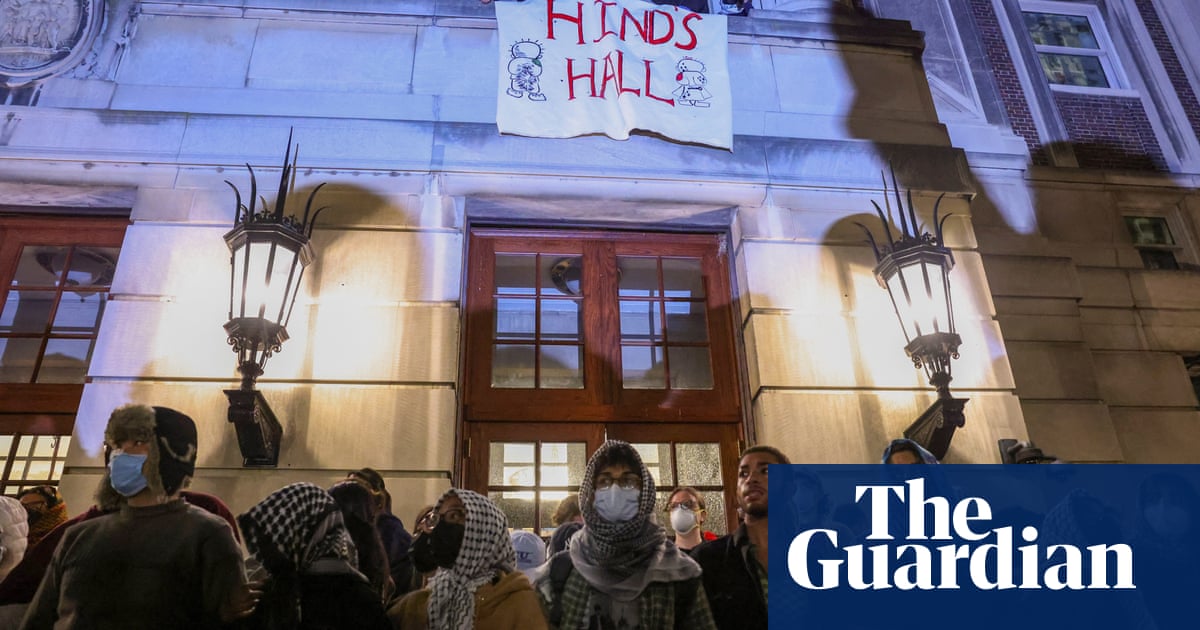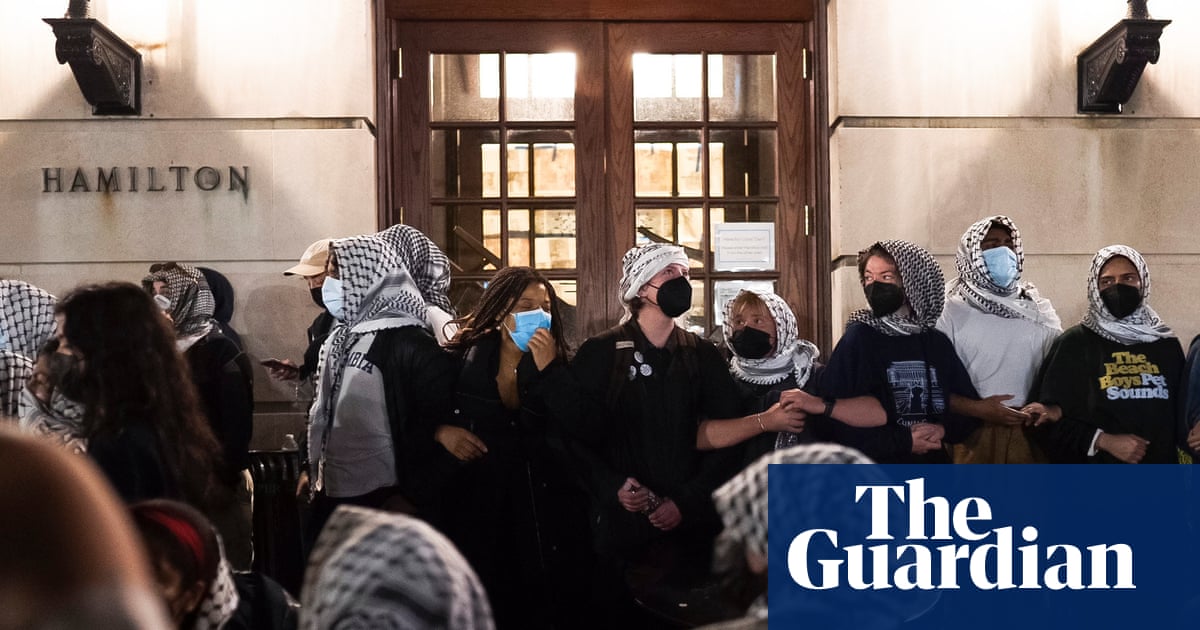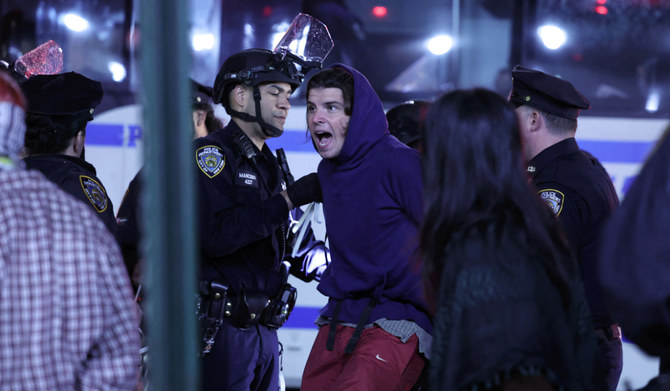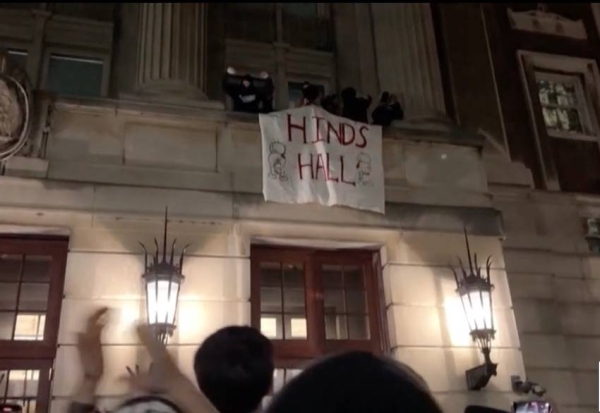
Columbia University students who took over an academic building early on Tuesday now face expulsion, a spokesperson for the university said, as tensions surrounding the students’ pro-Palestinian demonstration escalated.
The specter of expulsion came after dozens of protesters took over Hamilton Hall, an academic building on the New York campus, barricading the entrances and unfurling a Palestinian flag out of a window.
“We made it very clear [on Monday] that the work of the university cannot be endlessly interrupted by protesters who violate the rules,” a Columbia spokesperson, Ben Chang, said. “Continuing to do so will be met with clear consequences. Protesters have chosen to escalate to an untenable situation – vandalizing property, breaking doors and windows, and blockading entrances – we are following through with the consequences we outlined yesterday.
“Students occupying the building face expulsion.”
Hamilton Hall was one of several buildings occupied during a 1968 civil rights and anti-Vietnam war protest on the campus. Now student protesters there have overtaken it once again, displaying a large banner that reads “Hind’s Hall”, renaming it in honor of Hind Rajab, a six-year-old Palestinian girl from Gaza City who was killed by Israeli forces earlier this year.
Posts on an Instagram page for protest organisers shortly after midnight urged people to protect the encampment protest on campus and join them at Hamilton Hall. Those signs of supports surfaced as the UN human rights chief said he was “troubled” by how law enforcement has dealt with the recent wave of campus demonstrations.
The student radio station, WKCR-FM, broadcast a play-by-play of the hall’s takeover – which occurred nearly 12 hours after Monday’s 2pm deadline for the protesters to leave an encampment of about 120 tents or face suspension.
Representatives for the university did not immediately respond to emails requesting comment early on Tuesday. But in a statement, the university’s public safety department said it had limited campus access to students living in residential buildings and essential employees, such as dining, public safety and maintenance staff.
The statement said there was a single access point in and out of campus.
Columbia’s pro-Palestinian protesters ignored the Monday ultimatum to abandon their encampment or risk suspension. The university said it started suspensions early on Monday evening.
“We have begun suspending students as part of this next phase of our efforts to ensure safety on our campus,” the university said in an update on its website. “Once disciplinary action is initiated, adjudication is handled by several different units within the university based on the nature of the offense.”
The ultimatum came after the university’s president, Minouche Shafik, announced that efforts to reach a compromise with protest organisers had failed. She said that the institution would not bow to demands to divest from Israel.
Universities across the US are grappling with how to clear out encampments as commencement ceremonies approach, with some continuing negotiations and others turning to force and ultimatums that have resulted in clashes with police.
Dozens of people were arrested on Monday during protests at universities in Texas, Utah and Virginia, while Columbia said hours before the takeover of Hamilton Hall that it had started suspending students.
Demonstrators are sparring over the Israel-Hamas war and its mounting death toll, and the number of arrests at campuses nationwide is approaching 1,000 as the final days of class wrap up. The outcry is forcing colleges to reckon with their financial ties to Israel, as well as their support for free speech.
Some Jewish students say the protests have veered into antisemitism and made them afraid to set foot on campus. And one prominent supporter those voices are counting on is the US House speaker, Mike Johnson.
The Louisiana Republican on Tuesday accused pro-Palestinian protesters such as the ones at Columbia of going beyond their right to engage in “vigorous disagreement”.
“Shutting down the campuses, you know, control of buildings … at some point you cross the line, and they have,” Johnson said. “This is not protected free speech. This is violating the rights of others.”
At the University of Texas at Austin, an attorney said at least 40 demonstrators were arrested on Monday. The confrontation was an escalation on the 53,000-student campus in the state’s capital, where more than 50 protesters were arrested last week.
Later on Monday, dozens of officers in riot gear at the University of Utah sought to break up an encampment outside the university president’s office that went up in the afternoon. Police dragged students off by their hands and feet, snapping the poles holding up tents and zip-tying those who refused to disperse. Seventeen people were arrested.
The university said it was against code to camp overnight on school property and that the students were given several warnings to disperse before police were called in.
The UN human rights chief said on Tuesday he was “troubled” by the heavy-handed tactics of security forces across US campuses.
“I am concerned that some of law enforcement actions across a series of universities appear disproportionate in their impacts,” Volker Turk said in a statement sent to journalists, in which he made reference to arrests and sanctions of students.
“It must be clear that legitimate exercises of the freedom of expression cannot be conflated with incitement to violence and hatred,” he added.
Human rights clinics at law schools at Columbia, Harvard, Yale, New York University, Cornell and others called recent actions taken by university administrations “the latest escalation in a wave of repression of student speech in support of Palestinian human rights”.
“Protection of freedom of expression and assembly are also central to our institutions’ educational missions. Retaliatory actions against students and suppression of freedom of expression and assembly interfere with a number of other core human rights, including, critically, the right to education,” a joint statement from the clinics said.
The plight of students who have been arrested has become a central part of protests, with the students and a growing number of faculty demanding amnesty for protesters.
The Texas protest and others – including in Canada and Europe – grew out of Columbia’s early demonstrations that have continued. On Monday, student activists defied the 2pm deadline to leave the encampment. Instead, hundreds of protesters remained.
Columbia’s handling of the demonstrations has prompted federal complaints.
A class-action lawsuit on behalf of Jewish students alleges a breach of contract by Columbia, claiming the university failed to maintain a safe learning environment, despite policies and promises. It also challenges the move away from in-person classes and seeks quick court action requiring Columbia to provide security for the students.
Meanwhile, a legal group representing pro-Palestinian students is urging the US Department of Education’s civil rights office to investigate Columbia’s compliance with the Civil Rights Act of 1964 for how they have been treated.
A university spokesperson declined to comment on the complaints.












